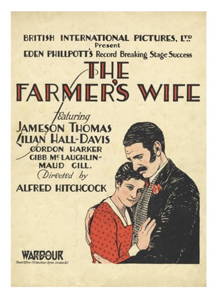If I had a time machine to observe audience reactions of the past, I’d first go to an opening screening of “Psycho” (1960) to enjoy people’s shock at the shower scene while munching on popcorn. Then I’d go to 1928 to see “The Farmer’s Wife,” because I can’t imagine people laughing uproariously at this early Alfred Hitchcock “comedy.” But according to historical reports, they did.
That’s the one thing I have to be thankful for about this silent film’s existence: It was part of a string of movies popular enough to keep Hitch in the business, eventually allowing us to get his masterpieces.
As I noted in my review of “Mr. & Mrs. Smith” (1941), Hitch’s one straight comedy from the talkie era, he’s not good at pure comedies. As a spice in suspense films, his sense of humor is fine. And the fact that he approached non-comedic material like “Psycho” as comedies works out well for the rest of us.

“The Farmer’s Wife” (1928)
Director: Alfred Hitchcock
Writers: Eliot Stannard (screenplay), Eden Phillpotts (play)
Stars: Jameson Thomas, Lillian Hall-Davis, Gordon Harker
Admittedly, I’ve enjoyed some of his melodramatic romps as throwaway entertainment … so long as they are a reasonable length. “Champagne” (1928) is as slight in plot as “The Farmer’s Wife,” but it’s 86 minutes long. “The Pleasure Garden” (1925) is hit-and-miss, but at least it’s only 75 minutes.
The version of “The Farmer’s Wife” on YouTube is 111 painful minutes. IMDb lists it at 129 minutes, and I feel for folks who found that version. I’ve also heard that some people watch these silents without music! That sounds torturous.
The farmer’s long search
When entrusted with pure comedies, the Master of Suspense loses his sense of pacing, and even a good piano score added in modern times can’t help him. The core plot finds widower farmer Sam Sweetland (Jameson Thomas) looking to remarry. His maid, Minta (Lillian Hall-Davis), helps him make a list of bachelorettes in the area, and we proceed to see him ask each of the four candidates to marry him.
A nice symbolic motif – in which Hitch uses his favored technique of overlapping negatives — finds Sam looking at the empty chair across from his in front of the hearth, picturing the bachelorettes sitting there. On her own, Minta lovingly circles that chair. Like most rom-coms, “The Farmer’s Wife” telegraphs everything.
Still, the genre can be cute if it has good rhythms, appealing characters and some zingers. (Perhaps the 1941 version of “The Farmer’s Wife” is closer to this type, but it seems unfindable.) If there was a fan edit limiting us to Sam’s courting scenes of the four candidates, it’d be a breezy trifle. But the stuff in between those sequences is interminable, with the director’s “joke” being that social gatherings (a wedding, then a party) are awful for introverted people. You’re preaching to the choir, Hitch.

Some slapstick is OK in a vacuum, like a woman in a large wheelchair being awkwardly moved into a room. Or doorman Ash (facial contortionist Gordon Harker) struggling to keep his pants up after his button pops loose. But the timing is totally nonexistent; we spend what seems like a half-hour on the loose-pants gag.
Writer Eliot Stannard – working from Eden Phillpotts’ 1916 play – comes up with one decent line, when Sam tries to woo his second candidate, the thin Thirza Tapper (Maud Gill), by stumbling over an explanation of how he doesn’t necessarily require a fat wife. (The other candidates are on the chunky side.)
Not a typical rom-com … but not to its benefit
“The Farmer’s Wife” eschews the common rom-com format where Sam’s candidates would be physically attractive but have awful personalities, and then he’d eventually notice Minta, who has a wonderful personality and – surprise! – is attractive if she puts her hair down. Instead, Minta is always the best-looking of the bunch.
Sam essentially learns that – even in the 1920s – he can’t just randomly ask women to marry him; he should first see if they have chemistry. One woman is too independent, another is asexual, another is too young for him. The fourth one’s traits had been hidden from the viewer, giving us a surprise to look forward to, but she turns out to be a frumpy barmaid who rejects him off-screen for unknown reasons.
Sam himself isn’t the most likeable guy, because “The Farmer’s Wife” starts off so awkwardly. Sam stands at the window, looking out on his farm, as his wife takes her dying breaths with Minta at her bedside. Sure, it’s possible he loves her deeply and had stepped away at the wrong moment, but it’s a weird storytelling choice. In this opening scene, it’s not clear that Sam is the farmer; I thought perhaps he was a doctor. I had assumed the farmer was Ash, who is moping through the yard – but we learn he is merely the farmhand.
We finally get to a happy ending; at least Stannard and Hitch don’t mess that up. We also get a coda that’s perhaps a statement that Sam is unappealing to women when no one wants him, and becomes appealing once Minta shows interest. In one last gag, he has to fight off two of the women who had rejected him. It’s like the adage about how a man should put on a wedding ring if he wants women’s attention at the bar.
But another adage rings truer when it comes to “The Farmer’s Wife”: When you have an hour’s worth of material, your film should be an hour long.
RFMC’s Alfred Hitchcock series reviews works by the Master of Suspense, plus remakes and source material. Click here to visit our Hitchcock Zone.

